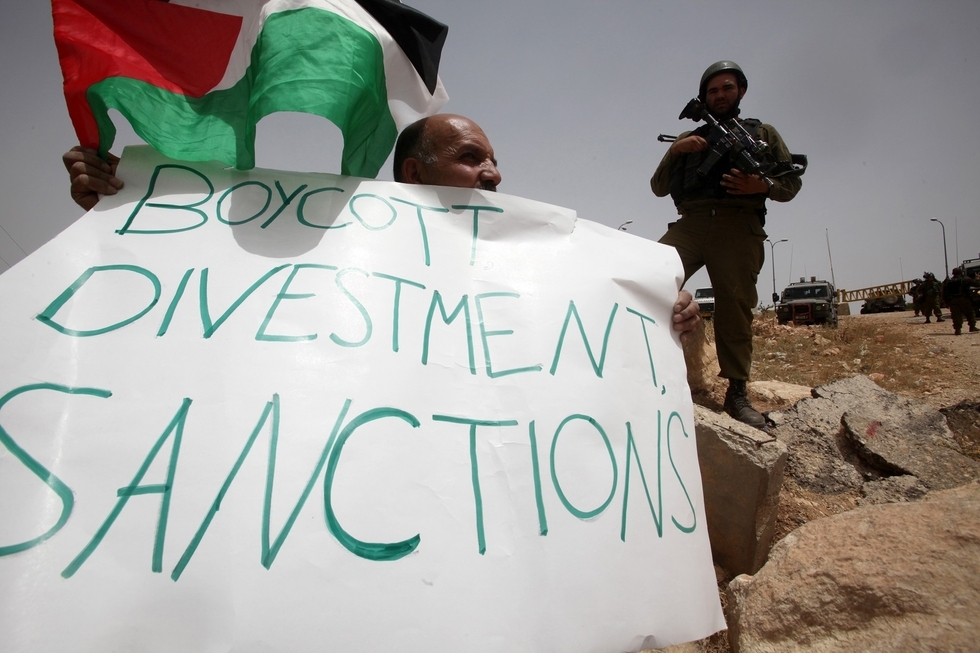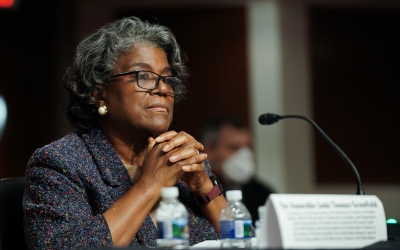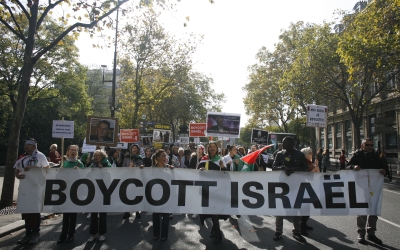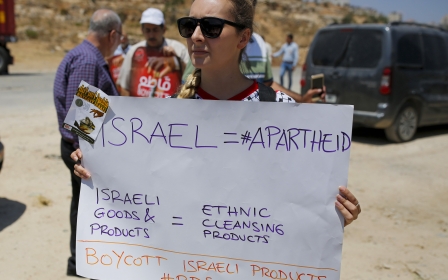Biden urged to publicly support rights of citizens to boycott Israel

A leading human rights group has called on US President Joe Biden to oppose laws and policies that would restrict the rights of citizens and businesses to boycott Israel over its settlement building and human rights violations.
Human Rights Watch (HRW), in a statement on Monday, called on Biden to "defend free speech rights" in the United States, including the right to take part in the Palestinian-led Boycott, Divestment and Sanctions (BDS) movement.
New MEE newsletter: Jerusalem Dispatch
Sign up to get the latest insights and analysis on Israel-Palestine, alongside Turkey Unpacked and other MEE newsletters
The BDS campaign is a non-violent initiative that encourages individuals, nations and organisations to censure Israel's consistent violations of international law and human rights standards through various boycotts.
During the past several years, the movement, increasingly popular among university students, has been attacked as antisemitic, with those making the accusations alleging that BDS unfairly singles out Israel's violations while ignoring abuses made by other countries.
While Biden has not condemned the BDS movement as antisemitic, during his presidential campaign he denounced the initiative for "singling out" and "delegitimising Israel".
HRW rejected that stance in Monday's statement, arguing that "to campaign or boycott solely on behalf of Palestinians under Israeli rule no more constitutes anti-Semitism than doing so on behalf of Tibetans in China is in itself anti-Chinese racism".
Dozens of Jewish groups worldwide and hundreds of leading Jewish and Israeli scholars have also come out against equating BDS and other criticisms of Israel as antisemitic.
Concern over statements by incoming officials
Eric Goldstein, acting Middle East and North Africa executive director at HRW, noted that Israel's settlements in the occupied West Bank - the main target of the BDS movement - are illegal under the Fourth Geneva Convention, to which the US is a signatory.
Countries that violate the Geneva Conventions can be held accountable for charges of war crimes. More than 600,000 Israelis live in over 230 settlements in the occupied West Bank and East Jerusalem.
While the US has long been opposed to Israel's settlement expansion, former President Donald Trump, in addition to adopting a series of unprecedented measures in support of Israel, rejected criticisms of Israeli settlements and strongly condemned the BDS movement.
'Biden… should defend free speech rights, which include the right to call for peaceful boycotts, even if he remains anti-BDS'
- Human Rights Watch
Biden has indicated his administration will restore US policy of opposing settlement expansion in the occupied Palestinian territories, but HRW expressed scepticism over the likelihood that the Biden White House would renounce the former administration's anti-BDS efforts.
"Joe Biden's inauguration as president is unlikely to end governmental efforts to malign the [BDS] campaign against Israel, including in ways that threaten free speech," the group alleged.
HRW expressed particular concern over recent statements made by incoming Biden officials.
At a Senate confirmation hearing last week, Linda Thomas-Greenfield, Biden's pick for ambassador to the UN, declared that the BDS movement "verged on antisemitism" and should "not be allowed to have a voice at the United Nations". HRW called Thomas-Greenfield's statements "disturbing".
Secretary of State Antony Blinken also denounced the BDS movement during his confirmation hearing, but still defended "the First Amendment rights of Americans to say what they believe and think".
'Publicly repudiate Trump's legacy'
HRW called on Biden to take a similar stance, declaring that even if Biden does not support the movement himself, he should come out in support of the rights of others to do so.
"Biden… should defend free speech rights, which include the right to call for peaceful boycotts, even if he remains anti-BDS," the group said on Monday.
"He should also oppose laws that penalize companies seeking to disentangle themselves from rights abuses inherent in Israeli settlements. And he should publicly repudiate Trump's legacy of tarring criticism of Israel as anti-Semitic in spurious ways," the statement continued.
At least 25 US states have passed anti-BDS laws in recent years, and nearly all have had some sort of anti-BDS legislation introduced at the state level.
Most of the bills, backed by pro-Israel lobby groups, are nearly identical in that they target companies that support BDS by barring them from taking on state government contracts.
Several of the laws have been repeatedly struck down in courts as a violation of free speech.
The BDS movement - modelled after a similar campaign credited with ending apartheid in South Africa - was founded in 2005 by over 170 Palestinian organisations that were pushing for "various forms of boycott against Israel until it meets its obligations under international law".
The movement has gained thousands of followers around the world, as individuals and groups cut economic, cultural and academic ties to Israel over its human rights abuses.
In November, then-Secretary of State Mike Pompeo said he planned to commit the State Department to "countering the Global BDS Campaign as a manifestation of anti-Semitism", and threatened to pull funding to any non-governmental organisation (NGO) that supported BDS, which he labelled "a cancer".
Pompeo did not go through with creating the list of NGOs sympathetic to the cause during the last few months of the administration "for unexplained reasons", HRW pointed out in Monday's statement.
He did, however, succeed in changing US import rules regarding Israeli products produced in illegal settlements, allowing them to now be labelled as "made in Israel", in a direct hit to the BDS movement's ability to target settlement goods.
Middle East Eye delivers independent and unrivalled coverage and analysis of the Middle East, North Africa and beyond. To learn more about republishing this content and the associated fees, please fill out this form. More about MEE can be found here.






